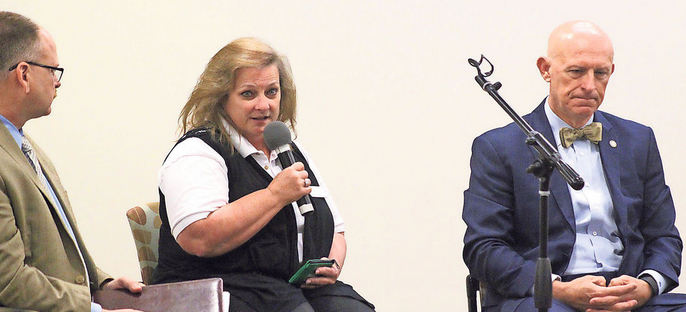Law enforcement officials say heroin is a major problem in Cobb County, citing an increase in the amount of the drug confiscated by police as well as a rise in the number in overdose deaths.
“Categorically, without any hesitation … we have a heroin epidemic in Cobb County,” said Cobb District Attorney Vic Reynolds.
In 2015 alone, there were 60 overdose deaths in Cobb, according to Reynolds.
Speaking at a recent meeting of the Marietta Area Council, Reynolds said from 1995 through 2014, about 3.5 pounds of heroin was confiscated by the undercover agents of the Marietta-Cobb-Smyrna Narcotics unit.
In 2015, more than 18 pounds of heroin was confiscated.
“Six times (the amount) in one year what we had in the last 20 years,” Reynolds said, adding that his office has a special unit prosecutes only major narcotics trafficking cases, the majority of which are heroin related. “Hopefully that gives you some idea of what we’re seeing.”
Cpt. Hawk Hagebak, a 27-year Cobb police veteran who currently heads up the MCS intelligence unit, put these numbers in perspective. Hagebak said one “dose” of heroin is about 0.1 grams, which has a street value of about $20, so 18 pounds of heroin is equivalent to about 81,000 doses of the drug.
Hagebak said 10 years ago, the county had a problem with cocaine and pill mills, small medical offices where doctors would freely prescribe patients opioid painkillers, such as Vicodin, OxyContin and Percocet.
“That’s where the addiction sort of began,” Hagebak said.
However, with tougher laws in Georgia regulating these clinics and crackdowns from federal law enforcement agencies, those addicted to these painkillers began turning to heroin, resulting in an increase in the prevalence of the drug within the last three to four years.
“It’s been present as an underlying current, but it’s really gained strength. It was of course present in the ’60s, early ’70s, but it was mostly inner city,” he said.
As a result, the types of people who use heroin has changed, Hagebak added.
“If you’re breathing and you’re human, chances are good that you fit the profile for a heroin-addicted user. That is the profile that we’re seeing,” he said.
Missy Owen is the co-founder and executive director of the Davis Direction Foundation, a Kennesaw-based nonprofit that aims to provide resources for heroin and opioid addicts. Owen agreed with Hagebak’s characterization of the types of addicts she sees.
“We’re not talking about the image that most people think of when you think of a drug addict. We’re talking about kids who are struggling because they may have been prescribed an opioid … because they have a toothache or they had their wisdom teeth removed or because they had sports injuries or (been in) a car wreck,” Owen said.
Owen started the foundation in March 2014 after her son, an honor student and on the dean’s list at Kennesaw State University, overdosed on heroin.
Reynolds echoed Owen’s assessment, saying many addicts start in a medicine cabinet, using painkillers prescribed to parents or grandparents.
“Once the grandparents’ or the parents’ or their prescription runs out and they buy Oxy on the street, it’s so expensive. Heroin’s cheaper,” Reynolds said.
So how is the county dealing with the epidemic? In addition to the work being done by the MCS unit, Reynolds praised the county’s accountability courts, which provide treatment instead of jail time to some convicted of drug-related crimes, as well as organizations like the Davis Direction Foundation.
For instance, Owen said Reynolds donated $30,000 to the organization to help them start a treatment facility known as “The Zone.”
The majority of those who come into the facility are between 19 and 32 years old, Owen said, and The Zone provides a place for addicts to come for continued treatment and to help people stay in recovery rather than relapse.
Hagebak added that police needs help from citizens, and encouraged anyone who may have information about drug-related activities to call 770-590-5554 to leave an anonymous tip.
“We do get an awful lot of information, tips, from citizens. Without your partnership, this job is absolutely impossible,” Hagebak said.
Owen also encouraged everyone to clean out their medicine cabinets and dispose of painkillers that might be sitting around, adding that 75 percent of heroin addictions begin in a medicine cabinet.
Reprinted from Marietta Daily Journal, Monday, MAY 16. Article was written by Ricky Leroux.







